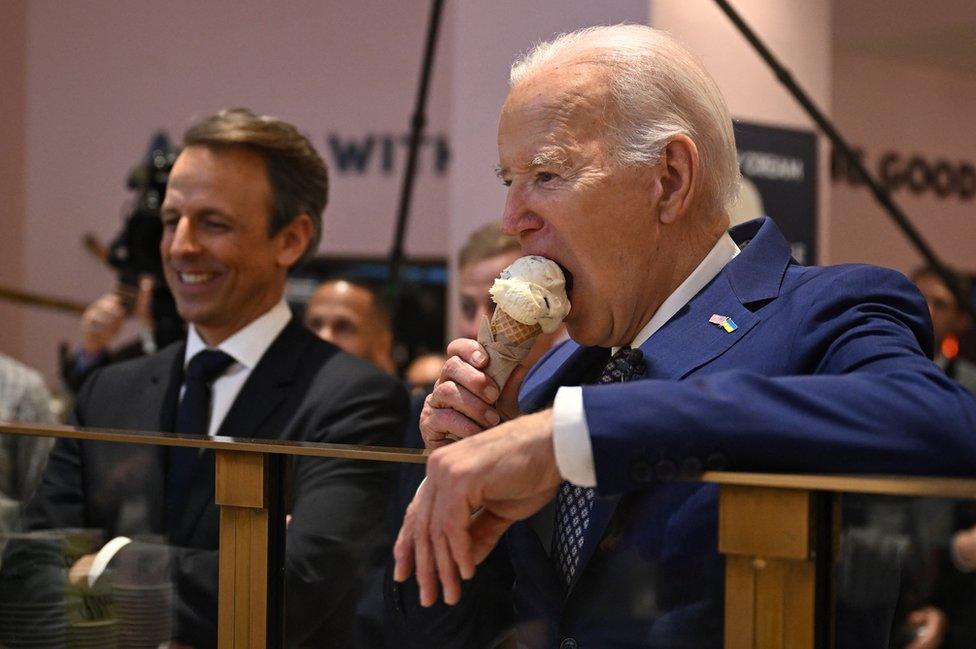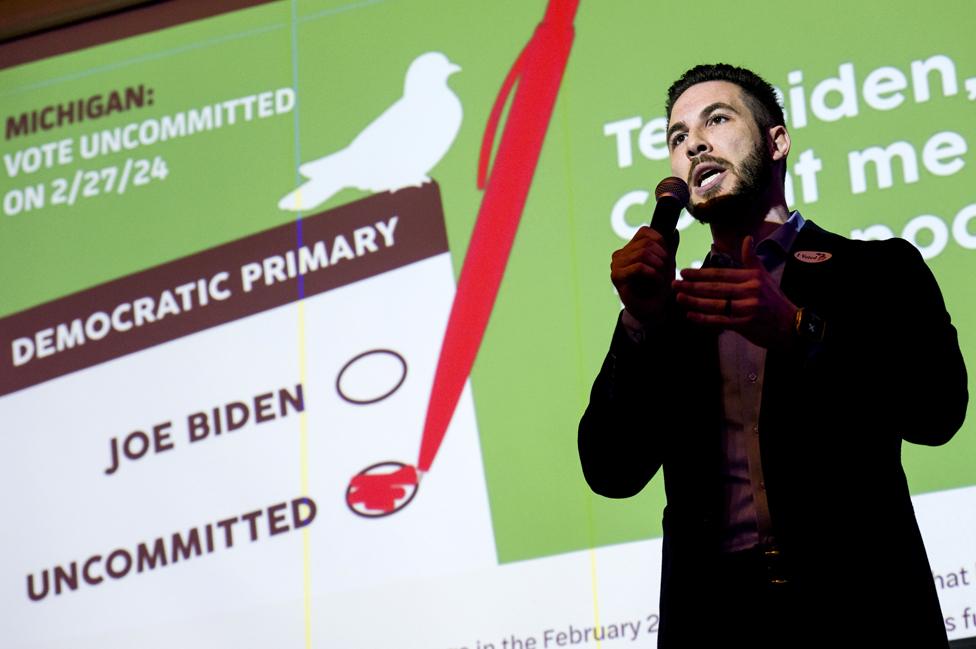Israel-Gaza briefings: Biden treading carefully through political minefield
- Published

On Monday afternoon, while snacking on ice cream with a late-night television talk show host, US President Joe Biden hinted that a new ceasefire was within reach in the Gaza War, perhaps as early as this coming Monday.
"My national security adviser tells me that we're close," he said.
His words, which the White House has since walked back, landed with a thud for many in the American Palestinian community.
Then on Tuesday night in Michigan, one of the key battlegrounds in November's presidential election, more than 100,000 people in the Democratic primary cast their ballot for "uncommitted" as part of a protest organised by pro-Palestinian groups.
"This is a warning sign," said Lexis Zeidan, one of the organisers, on Tuesday night.
This has been a week in which Mr Biden has been reminded that the turmoil in the Middle East, and the White House's response to it, could translate into electoral peril.
Since the start of the conflict after the 7 October attacks, the president has been caught in a vice, forced to make Middle East policy choices that anger key parts of his coalition.
But the Biden administration is treading carefully when it comes to substantive policy shifts. And despite this week's domestic pressure, the White House has largely remained set on its current course.
At a briefing on Thursday, US State Department Press Secretary Matt Miller said the US continues to give aid to Israel to support the nation's "legitimate right" to protect itself and prevent an attack like 7 October from happening again.
"There is a mistaken belief that the United States is able to dictate to other countries' sovereign decisions," he said. "Israel makes its sovereign decisions - we make clear where we disagree with them."
On background, US officials have said that the Americans are considering delaying further arms shipments to Israel and other measures.

Mr Biden is trying to balance competing constituencies in his party
Most opinion polls suggest the US public as a whole tends to support Israel in the conflict, even while key components of Mr Biden's Democratic coalition - young voters and people of colour - do not.
The domestic political calculations are complicated. His administration has to balance competing constituencies within the Democratic Party that could all claim they are essential to the president's re-election cause.
Pro-Palestinian groups in the US have called for a permanent ceasefire, support for diplomatic efforts in the United Nations and the threat of an end to American military aid to Israel if it does not change course.
"People are upset, and you've got to give them a reason not to be upset," says Jim Zogby, president of the Arab American Institute.
He describes the Biden administration's efforts so far as "ham-fisted, half-measure statements about how we were sorry we didn't express more sympathy and we're working behind the scenes".
The protest vote in Michigan amounted to less than the margin by which Mr Biden beat Republican Donald Trump in the state in 2020, but is much more than the 10,704 votes Democrat Hillary Clinton lost the state to him in 2016.
"There's no doubt that there were some folks in Michigan that wanted to send the president a message," Mitch Landrieu, the campaign's national co-chair, said on Thursday. "Every issue is complicated, and this is one of them that needs to be worked through."

The protest vote in Michigan was small but campaigners like Dearborn Mayor Abdullah Hammoud wanted to send Mr Biden a message.
In reality, while the pro-Palestinian groups are a vocal minority, they are still a minority, says Derry Sragow, a California-based political consultant.
"There's a chunk of the electorate that is very much focused on Gaza, but it's very small," he says.
"That's not to say that how the president deals with Gaza is unimportant, but it is just another brushstroke on the canvas that voters are going to be looking at when they cast their vote."
Polls show that the American public is more concerned about the economy, immigration and abortion rights.
And even in Michigan, Mr Sragow notes, there are as many Jewish voters who are passionate about supporting Israel as there are pro-Palestinian voters. And Jewish voters continue to overwhelmingly support Democrats, with more than 70% backing him in 2020 and polls showing that majorities approve of his handling of the Gaza War.

Emotions are raw as civilian bloodshed continues in Gaza
With eight months until the election, Biden campaign officials are hoping that the prospect of a binary choice between Mr Biden and Mr Trump will encourage dissenting voices in the Democratic Party's political coalition to ultimately fall into line.
Campaign officials are already pointing to a number of controversial policies Mr Trump implemented during his presidential term, such as moving the US embassy in Israel to Jerusalem and support for Jewish settlements on the West Bank.
But with new headlines of civilian bloodshed in Gaza virtually every day, emotions are raw. This week the death toll in Gaza surpassed 30,000, according to the Hamas-run health ministry. And on Thursday at least 117 Palestinians were killed and hundreds were injured during an aid delivery in Gaza.
"We're supposed to be in the position where you hurt us, you ignore us, you pay no attention to our feelings, but we'll have to vote Democrat?" says Mr Zogby. "Why can't you apply that same logic on the side of the Jewish community?"
Meanwhile, Israeli Prime Minister Benjamin Netanyahu has being going to lengths to dash any White House hopes that a change in rhetoric will put more pressure on Israel to conclude the war.
"From the beginning of the war, I have been leading a diplomatic campaign whose goal is to deflect the pressure to end the war prematurely," he said this week.
Mr Netanyahu seems finely attuned to the US domestic political situation, as well, and says the American public overwhelmingly supports his cause.
All of this suggests Mr Biden has few easy means to extricate himself from his current political predicament.
"He's been dealt a very, very limited, difficult hand to play," says Sragow. "If I was a member of the senior staff advising Biden, I don't know what I would say other than just do what you think in your heart is the right thing to do."
The pro-Palestinian groups in the US would probably echo this sentiment, except they firmly believe the president's heart is in the wrong place - and that he is poised to pay a high political price for it come November.

Israel-Gaza war: Death and Israel’s search for ‘total victory’
What are routes out of this 'dangerous moment' in Middle East?
Huge push for Gaza aid - but little hope for those suffering
Iran's sudden strikes show just how perilous region has become
Huge challenges for Israel on its vague 'day after' Gaza plan
Hamas support soars in West Bank - but full uprising can still be avoided
The status quo is smashed. The future is messy and dangerous
Bowen: US sets clearer red lines for Israel as ceasefire ends
- Published24 February 2024

- Published11 February 2024

- Published3 February 2024
